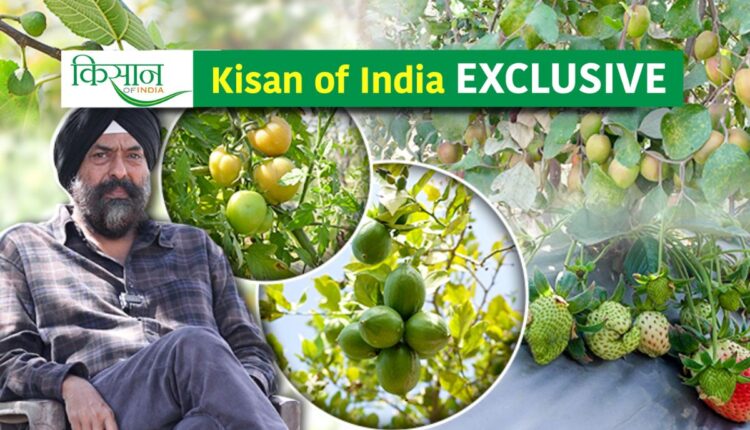Fig and Strawberry Farming: How a Father-Daughter Duo is Changing Bundelkhand’s Agriculture
Strawberries are known as a fruit that grows only in cold climates. But you’ll be surprised to know that in Bundelkhand—where summer temperatures reach 44 degrees Celsius—strawberry farming is thriving. This remarkable achievement has been made possible by young farmer Gurleen Chawla and her father Harjeet Singh Chawla, who treat farming as a business and are always experimenting with new ideas.
In fact, Prime Minister Narendra Modi even mentioned Gurleen’s strawberry farming in his Mann Ki Baat program. Speaking with Kisan of India, Harjeet Singh discussed in detail how strawberries, apples, plums, and figs are now being cultivated in Bundelkhand.
Farming Was the First Occupation
Harjeet Singh recalls that his love for farming began at a young age. At just 19, his very first venture was agriculture. He bought land in the forests of Dangarwa, far from Jhansi, at just ₹500 an acre and began farming successfully. Guided by the newly established Grassland institute in Jhansi, he cultivated subabul, eucalyptus, and poplar, which were in high demand at that time. Later, he moved on to other businesses.
Farming Restarted From the Rooftop
In 2015–16, Harjeet Singh restarted farming—this time on the roof of his house. He experimented by growing vegetables and even strawberries there. Gradually, his daughter Gurleen also developed an interest in farming. By the time she finished her law degree during the COVID lockdown, she expressed a desire to grow strawberries on their 7-acre farm. That’s how strawberry farming began, and today it is running successfully. Harjeet proudly says that their strawberries are exceptionally sweet in taste.
Sandalwood Cultivation in Bundelkhand
Harjeet Singh believes in treating farming as a business and experimenting constantly. Alongside fruits, he has also started cultivating sandalwood, which usually takes 20–25 years to mature. The plants he planted two years ago have already grown to his height. The red soil of Bundelkhand, though hard, is suitable for sandalwood, but it requires more water. Since this region lacks natural humidity like Andhra Pradesh, Karnataka, or Tamil Nadu, Harjeet has artificially created moisture to aid growth. He sourced the seeds from Karnataka and raised the saplings in his own nursery.
A Variety of Fruits and Vegetables
Along with strawberries and sandalwood, Harjeet grows all kinds of vegetables and fruits. Guavas, figs, and peaches are flourishing on his farm. He has also planted avocado trees, which are expected to bear fruit from next year (usually they take 4 years). His guavas are particularly delicious.
Surprisingly, he even grows apples—traditionally cultivated in Kashmir and Himachal Pradesh. Although the Bundelkhand climate does not support large-sized apples, the smaller ones they grow are still tasty.
Strawberry Farming in Bundelkhand
Harjeet sources strawberry plants from Pune and transplants them in October, when the temperature drops to around 32–33°C. He explains that flood irrigation doesn’t work for strawberries, as it kills the plants. Instead, they use drip irrigation. They use minimal pesticides and rely mostly on organic fertilizers.
For planting, he maintains one-meter spacing between rows and 25 cm between plants. Planting too densely affects fruit quality, so proper spacing is crucial.
Care Like a Child
According to Harjeet, strawberry plants require care like a small child. While other crops can tolerate some negligence, strawberries demand daily monitoring of temperature and humidity. Based on this, water, fertilizers, and pesticides must be applied carefully.
Multi-Cropping is Best
Harjeet strongly believes that multi-cropping is essential for farmers. It reduces risk because even if one crop fails, the other ensures recovery of costs. On his farm, strawberries grow alongside garlic and ginger. He says chili can also be grown with strawberries, but crops like bitter gourd, bottle gourd, and ridge gourd should be avoided since they spread too much.
Additionally, he has planted guava, fig, and plum trees, which benefit strawberry plants by providing shade. Interestingly, strawberries grown under these trees bear better fruit. The trees don’t need extra care since they thrive on the same water and nutrients given to strawberries.
Guava and Plum Cultivation is Profitable
Harjeet suggests that Bundelkhand farmers should grow guavas, as they perform very well here. He grows a variety from Raipur that bears fruit for 7 months a year, producing 20–25 kg even from a small tree. Harjeet has also planted figs, currently on a trial basis.
He highlights the potential of apple plum (ber), which yields up to 100 kg per tree. Even if sold at just ₹20 per kg, farmers won’t face losses. Harjeet, however, sells his plums at ₹100 per kg. Similarly, he sells 200 grams of figs for ₹200.
No Market Problem
Unlike many farmers, Harjeet does not face marketing issues. He sends vegetables via railway to Delhi and Indore mandis. Railways prioritize agricultural produce, making it easier for small farmers with 2–5 quintals of harvest to transport their crops. The only requirement is having someone at the destination market to unload and sell the produce.
A New Face of Bundelkhand Farming
Thanks to Harjeet Singh and his daughter Gurleen, Bundelkhand’s markets are now flooded with strawberries—something unimaginable a few years ago. Harjeet plans to expand multi-cropping on larger land areas to ensure regular income. He advises farmers to move away from traditional farming and explore fruit cultivation, which is more profitable and sustainable.
Contact us – If farmers want to share any valuable information or experiences related to farming, they can connect with us via phone or whatsapp at 9599273766 or you can write to us at “[email protected]”. Through Kisan of India, we will convey your message to the people, because we believe that if the farmers are advanced then the country is happy.
You can connect with Kisan of India on Facebook, Twitter, and Whatsapp and Subscribe to our YouTube channel.



